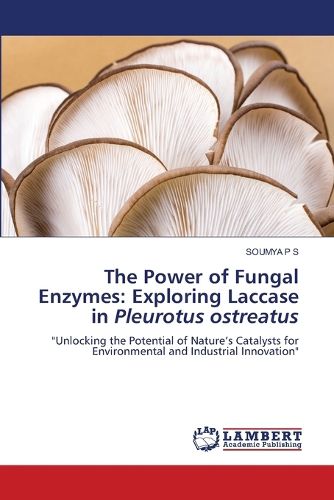Readings Newsletter
Become a Readings Member to make your shopping experience even easier.
Sign in or sign up for free!
You’re not far away from qualifying for FREE standard shipping within Australia
You’ve qualified for FREE standard shipping within Australia
The cart is loading…






"The Power of Fungal Enzymes: Exploring Laccase in Pleurotus ostreatus" dives into the intriguing world of fungal enzymes, focusing on the versatile laccase derived from the oyster mushroom, Pleurotus ostreatus. This comprehensive book explores the enzyme's biochemical properties, production methods, and its critical role in lignin degradation and environmental sustainability.Guiding readers through a detailed exploration, the book examines the molecular structure and reaction mechanisms of laccase, highlighting its significance in various biological processes. It also delves into factors influencing laccase production, including pH, temperature, nutrients, and cultivation methods like submerged and solid-state fermentation.Further, the book discusses the molecular biology of the laccase gene and purification techniques, offering practical insights to enhance enzyme activity and stability. The latter chapters explore the diverse applications of laccase in industries such as food, pulp and paper, textiles, bioremediation, bio-ethanol production, synthetic chemistry, and nanobiotechnology.
$9.00 standard shipping within Australia
FREE standard shipping within Australia for orders over $100.00
Express & International shipping calculated at checkout
"The Power of Fungal Enzymes: Exploring Laccase in Pleurotus ostreatus" dives into the intriguing world of fungal enzymes, focusing on the versatile laccase derived from the oyster mushroom, Pleurotus ostreatus. This comprehensive book explores the enzyme's biochemical properties, production methods, and its critical role in lignin degradation and environmental sustainability.Guiding readers through a detailed exploration, the book examines the molecular structure and reaction mechanisms of laccase, highlighting its significance in various biological processes. It also delves into factors influencing laccase production, including pH, temperature, nutrients, and cultivation methods like submerged and solid-state fermentation.Further, the book discusses the molecular biology of the laccase gene and purification techniques, offering practical insights to enhance enzyme activity and stability. The latter chapters explore the diverse applications of laccase in industries such as food, pulp and paper, textiles, bioremediation, bio-ethanol production, synthetic chemistry, and nanobiotechnology.